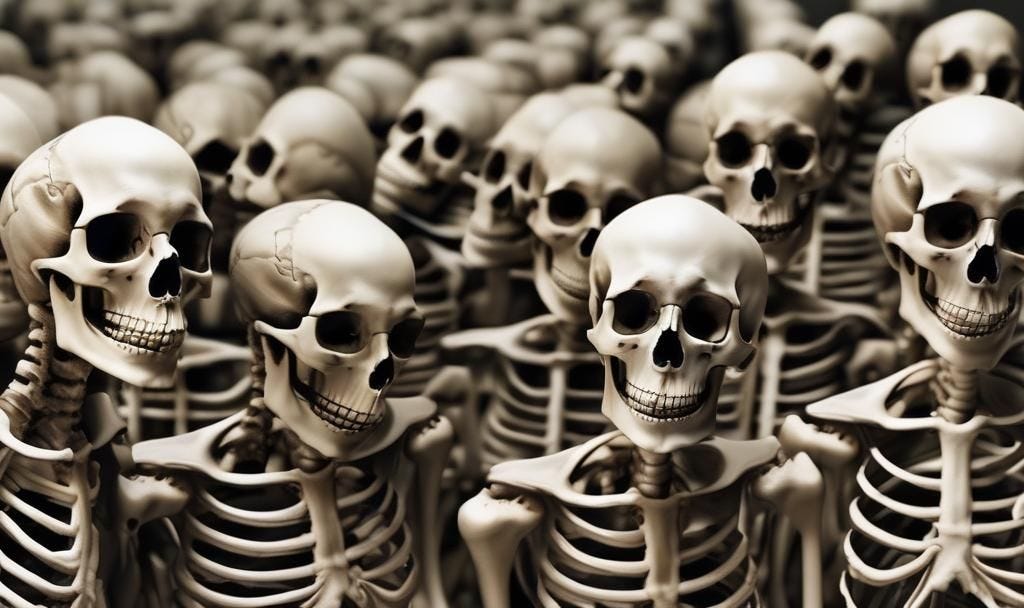This Halloween, Democracy is at the Door
On apocalyptish spectacle and the civic duty of trick-or-treating
It is fitting that every four years the election and Halloween seasons occur together, ensuring that, from the youngest to the oldest among us, all are subjected to total spectacle.
If the election and Halloween don’t meet the strict definition of apocalyptic, they are at least apocalyptish. What has been hidden in the shadows comes out into the light, revealing itself truly by doing so symbolically: the political schemers will put on the proper vestments and act out the state liturgy with solemnity and glory, and the children will wander neighborhoods, reminding those who dare open their doors that cute children are also human—with all that humanity implies.
My three-year-old daughter is fascinated with Halloween. The kitsch décor, the pumpkins, the spooky shows on TV. I’m no child psychologist, but I speculate there is more to her interest than the fact that what is scary is also generally mysterious and alluring: I suspect she is slowly coming into contact with the reality of the world, that it is not only a place of love, comfort, and safety, but that it also contains horrors, evil, and death. I don’t want her to see this shadow side of the world, but she must learn to see it if she is to survive. She must learn to see that, just as behind the scary mask is just a person, all people hide within themselves something ugly and unwell. At her age, it is appropriate to believe that there are good people and bad people, and perhaps Halloween is a controlled way for her to glimpse the harder reality: there are just people, each of whom is somehow both.
Several nights ago, and with Halloween on her mind, my daughter came across an illustration of the valley of dry bones coming to life in a children’s Bible, depicting the events of Ezekiel 37. After I read the story to her, she was disappointed. This story, she explained, was not interesting. It was not, as the depictions of reanimated skeletons strongly suggested, a Halloween story at all. This was just a “regular” Bible story.
She was wrong obviously. Not only is Ezekiel’s vision not regular, it is also in some ways the consummate Halloween story: hidden invisibly within the Lord’s own people is death and decay, and only the howling wind of God can raise them to life—which is what the Lord promises.
But what my daughter meant, and what prompted me to buy her a simple Bible translation without pictures, is that the story was not, as the illustrations promised, amusing. Just about everything else in her life is amusing: most of her books, TV shows (whether they purport to be educational or not), and, of course, Halloween. Regardless of what I, her theologian father, believe Halloween “actually” says, to her mind it is a day of candy and dressing up and general amusement.
That Halloween has a serious meaning to offer, which is nevertheless suffocated out of consciousness by its relentlessly amusing quality, is one of the key ways that it is fitting for the Halloween season to co-occur with the election season. It is not just that all of our news media, especially at its most self-serious, is the quintessence of entertainment and reality TV, but also that our politics has become spectacularly amusing in just this way. For all its seriousness and the genuine terror some people feel as a result, there is something undeniably amusing about people referring to Donald Trump as a “fascist”: it is amusing the way that it’s amusing to be scared. Meanwhile, Donald Trump’s entire political career has been that of a showman; the very same news media that have made it their mission to keep him from elected office have also played an instrumental role in bringing him to power by ensuring that news is first of all amusing. Our politicians and pundits don’t wear frightening costumes because their rhetoric is their apparel. Like young children who are developmentally unable to deal with the complexity of the world, they speak as though there are good guys and bad guys, too caught up in their own drama to notice reality. And like trick-or-treaters, people participating in their spectacle go from house to house, knocking on doors, asking people to vote—or else.
As a father, my hope for my daughter is that, despite the environment of total spectacle, she will somehow find something worthy of her attention that is not simply amusement. And perhaps then, God willing, she will be able to read the Bible and see that the spectacle around her was a plastic rendition of something real and durable and genuinely interesting. So also as an American: I hope that some day we’ll have a political discourse befitting adults.





Hi Matthew. I’m one of your subscribers bc I really enjoy your articles and always learn something from them. For myself Halloween has always been a time of fun dressing up even as an adult and now a grandma. Politics are a subject I have avoided bc it is frightening and the people in charge of our State and country are scary to me and should not be in office. However, how can we get the truly intelligent, Christian people to be willing to lead and fill these roles and positions? I wouldn’t want to. I’ve been a leader in my professional career and while it can be exciting and stimulating, it is exhausting! Keep writing, Matthew, so I can continue to be blessed and educated at the age of 77. 😊